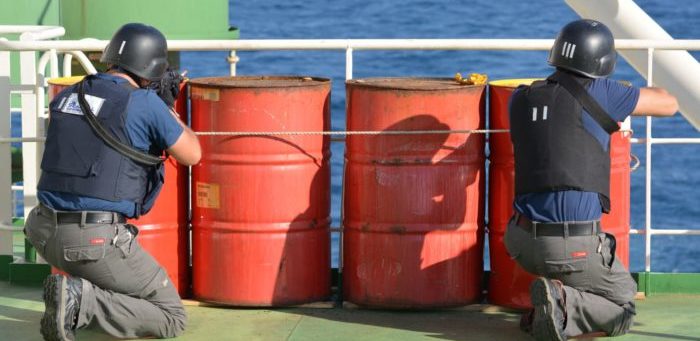Instead of relying on an ever-shifting number of rules and regulations which are in constant flux, ship managers should instead be looking at more permanent solutions to ensure maritime security, argued Steve Regis, COO, ARX Maritime, in a new article in the wake of the changing security environment in Nigeria.
Managing fleet security is a stressful job, even on a good day – understandably so.
You are responsible for your company’s bottom line. There’s cargo that needs to be delivered, budgets that need to be met, and ships that need to stay afloat. And all of these things are dependent on proper measures & practices. But there’s one more factor, that keeps managers awake at night. Security. Because there’s people out there whose lives depend on you.
It’s a given; when it comes to headaches and high-blood pressure, I am sure there’s no bigger contributor than the undisputed pirate capital of the world.
It’s a statement of fact – properly securing ships transiting through Nigeria is not an easy task by any stretch of the imagination.
On the one hand, the pirates are vicious; their methodology is continuously evolving, and they are well-equipped. On the flipside, you have a convoluted bureaucratic governmental mechanism that serves to further complicate ship security.
It’s an ever-shifting landscape of danger and red tape.
This year we’ve seen the Nigerian government attempt to flex its muscles by bringing the hammer down on third-party security providers.
In at least two separate occasions, we’ve seen the Nigerian Navy go out of their way to arrest security company personnel for providing armed security escorts to vessels transiting through their territorial waters. And just last month, we saw the Nigerian government outlaw the use of the privately-run Secure Anchorage Area outside Lagos, deeming it a “threat to national security”.
It was a move that surprised the industry; the Nigerian Ports Authority (NPA) decided, almost out of the blue, to dismantle the Secure Anchorage Area (operated on behalf of the Navy by the Nigerian-based company, OMSL limited).
The NPA insists that the privately-run SAA is a threat to national security and that it substantially increased the cost of doing business at the country’s main seaport.
In fact, the NPA maintains that the commercial maritime fleet transiting through the Nigerian Territorial waters should rely solely on the Nigerian Navy for its protection.
However, given the scope and magnitude of the threat, one cannot blame managers for trying to do the best they can to ensure the safety & security of their fleet. Moving forwards the temptation to hire an armed PMSC within WAF territorial waters is certainly high, but it can potentially cost you.
With Nigeria so vehemently, and perhaps for good reason, attempting to assert its dominance, chances are that you will be discovered. And should that happen, are you then prepared to face the full might of the Nigerian Government?
Best case scenario you’re facing a delay; worst-case, your vessel could be detained or even seized, and its crew members imprisoned. And don’t forget, there’s also the subject of reputation – takes a lifetime to build but a moment to destroy. However, it should be mentioned that there are legal avenues available, to ship managers who wish to pursue them.
Nigeria has issued an MOU to 17 security companies, that allows them to liaise with the Nigerian Navy to arrange armed security escorts for merchant vessels transiting through the WAF. It’s a convoluted method, which potentially serves to complicate what is already a rather difficult process. If you’re dead set on acquiring an armed escort, you’d first need to locate a properly vetted security company, who will then attempt to communicate with its Nigerian approved partner, who then arranges for Navy personnel to escort your vessel.
And therein lies the problem – it’s a process that has a large number of moving parts, requiring all of them to work in unison. With the solution-provider being so distanced from the shipping company, how can you hold them accountable as to the services they provide?
It’s a far easier, more effective, and less headache-inducing process, to operate in-house and deal directly with the problem. Instead of relying on an ever-shifting number of rules and regulations are in constant flux, ship managers should instead be looking at permanent, long term effective solutions.
Return to the basics – appropriate vessel hardening solutions are industry standard for a reason – because they work. By appropriately installing alarms, physical barriers, steel bars on windows, chain link fencing & reinforced doors (as seen on BMP5) you can effectively form a layer of defence that will outright deny unwanted access to your ship.
It’s a tried, true and tested method. It works. And most importantly, it gives the power back to the shipping companies.
The views presented hereabove are only those of the author and not necessarily those of SAFETY4SEA and are for information sharing and discussion purposes only.
About Steve Regis
 Steve Regis is a Chief Operations Officer and a former CEO at ARX Maritime, aiming to better protect ships from piracy. He is also a former Maritime Security Liaison Officer at Protection vessels International, ensuring the safe passage of vessels through areas of high risk. He has also been a Security Contracts Manager at Proficient Security Ltd. and a Senior Safety Inspector at BEAR Scotland.
Steve Regis is a Chief Operations Officer and a former CEO at ARX Maritime, aiming to better protect ships from piracy. He is also a former Maritime Security Liaison Officer at Protection vessels International, ensuring the safe passage of vessels through areas of high risk. He has also been a Security Contracts Manager at Proficient Security Ltd. and a Senior Safety Inspector at BEAR Scotland.
































































